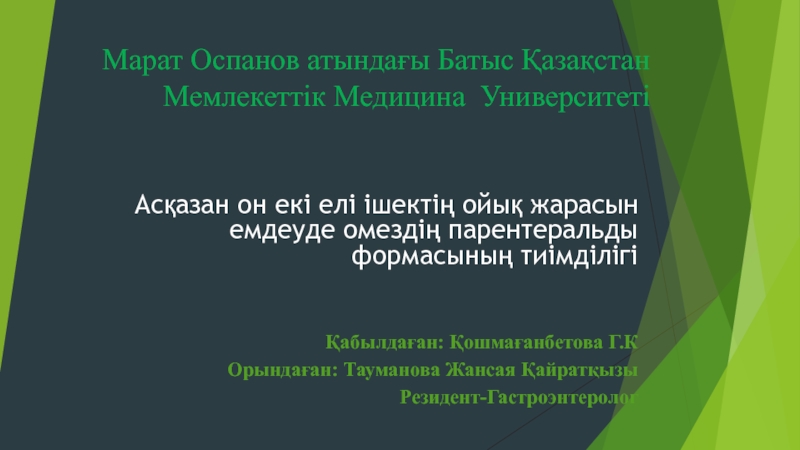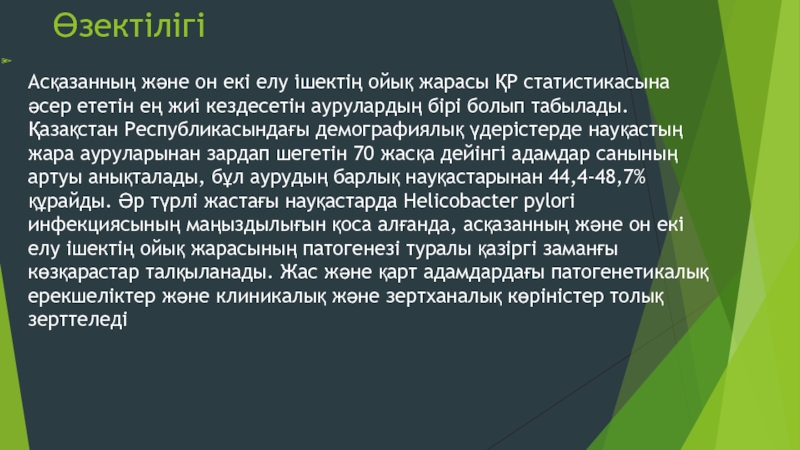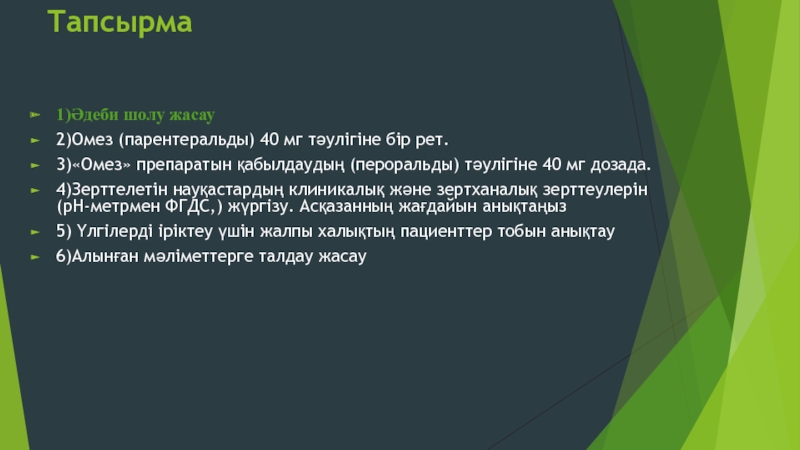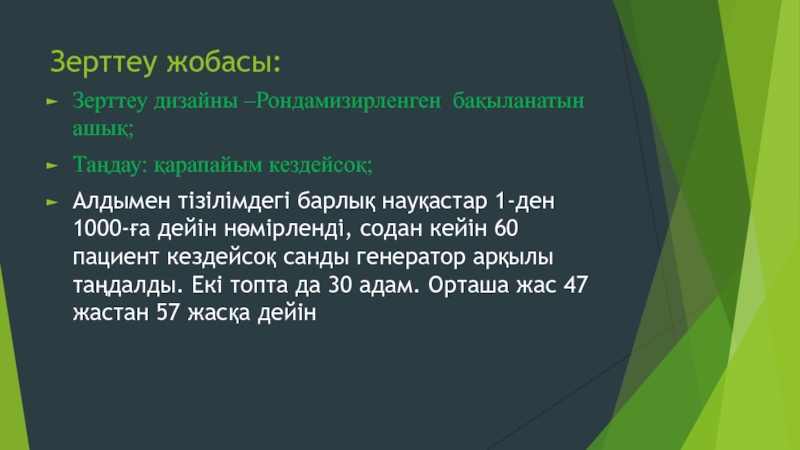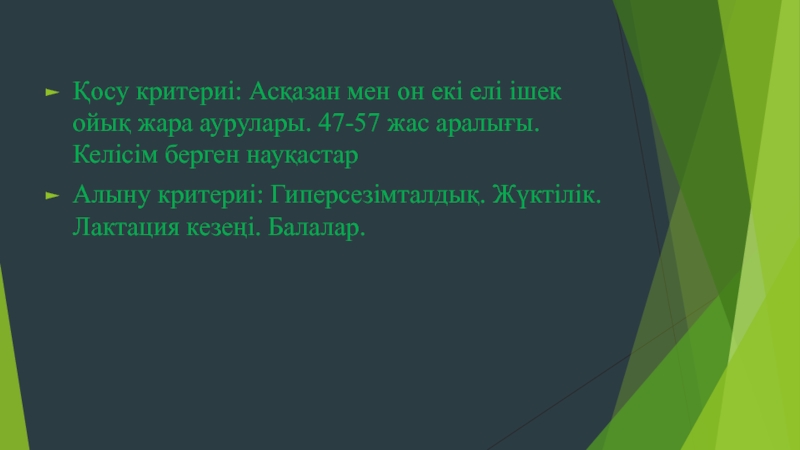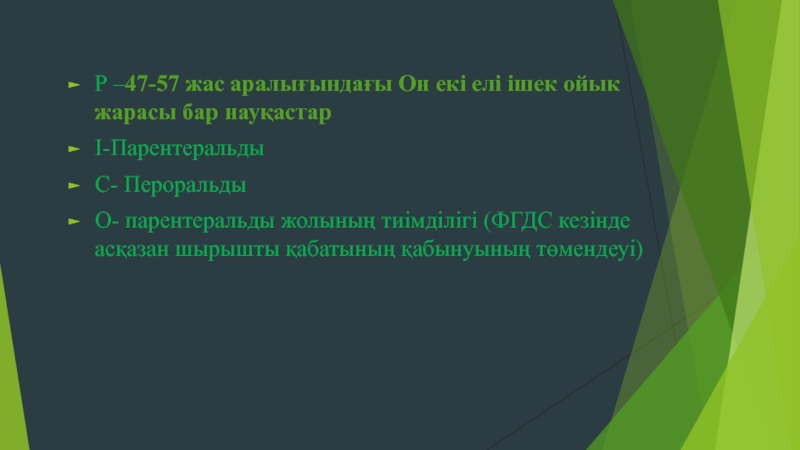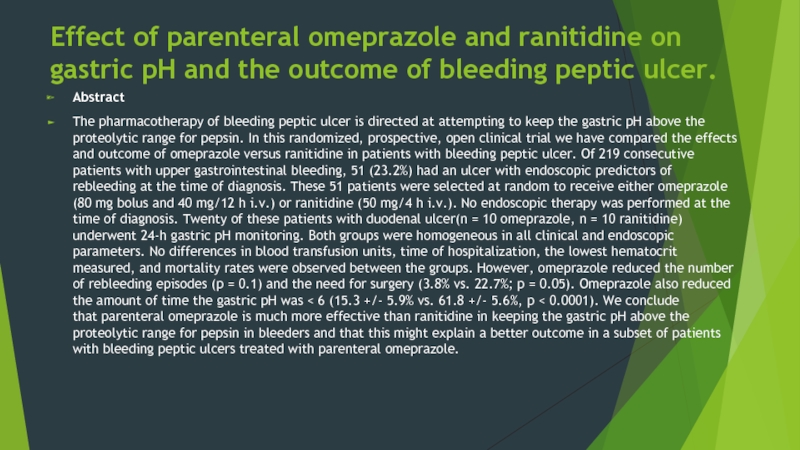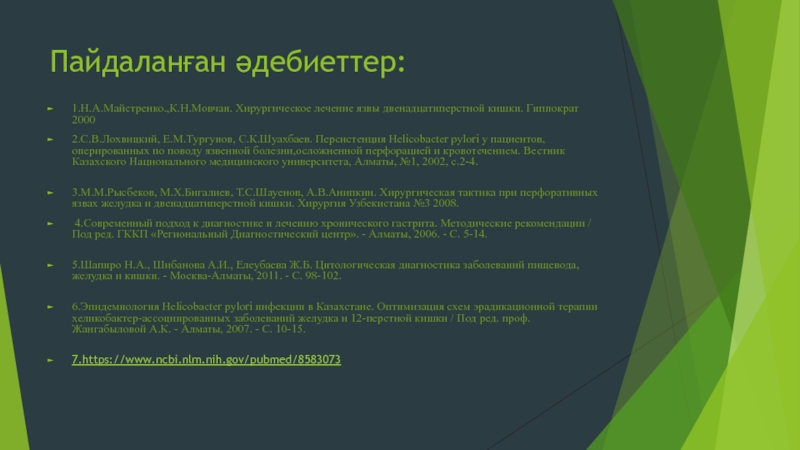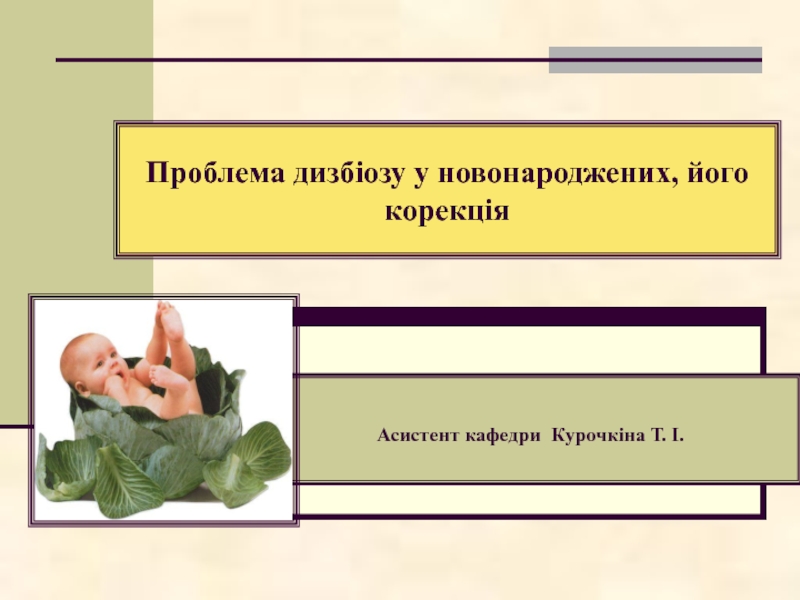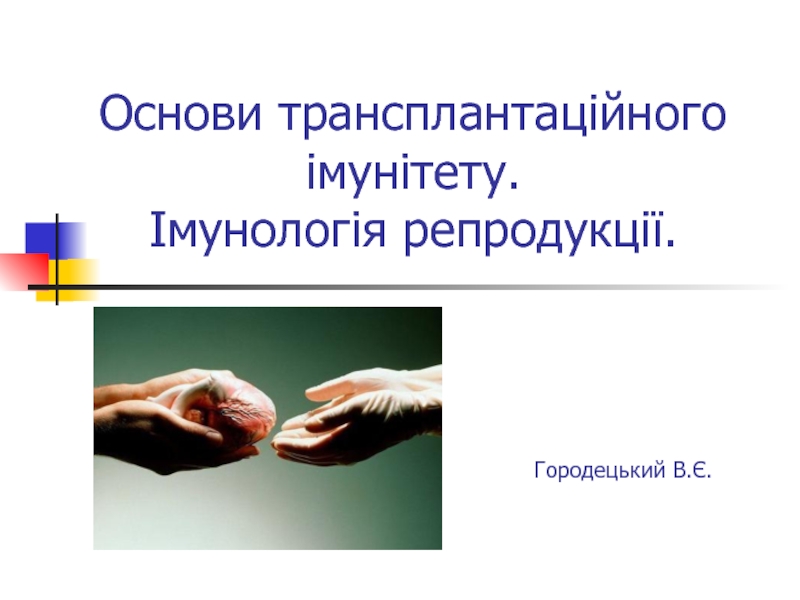- Главная
- Разное
- Дизайн
- Бизнес и предпринимательство
- Аналитика
- Образование
- Развлечения
- Красота и здоровье
- Финансы
- Государство
- Путешествия
- Спорт
- Недвижимость
- Армия
- Графика
- Культурология
- Еда и кулинария
- Лингвистика
- Английский язык
- Астрономия
- Алгебра
- Биология
- География
- Детские презентации
- Информатика
- История
- Литература
- Маркетинг
- Математика
- Медицина
- Менеджмент
- Музыка
- МХК
- Немецкий язык
- ОБЖ
- Обществознание
- Окружающий мир
- Педагогика
- Русский язык
- Технология
- Физика
- Философия
- Химия
- Шаблоны, картинки для презентаций
- Экология
- Экономика
- Юриспруденция
Асқазан он екі елі ішектің ойық жарасын емдеуде омездің парентеральды формасының тиімділігі презентация
Содержание
- 1. Асқазан он екі елі ішектің ойық жарасын емдеуде омездің парентеральды формасының тиімділігі
- 2. Өзектілігі Асқазанның және он екі елу
- 3. Мақсаты: Зерттеудің мақсаты асқазан он екі
- 4. Тапсырма 1)Әдеби шолу жасау 2)Омез (парентеральды) 40
- 5. Зерттеу жобасы: Зерттеу дизайны –Рондамизирленген бақыланатын ашық;
- 6. Қосу критериі: Асқазан мен он екі елі
- 7. Сұрақ: 47-57 жас аралығындағы асұазан он екі
- 8. Р –47-57 жас аралығындағы Он екі елі
- 9. Этикалық аспектілер: Этикалық комитетпен рұқсат етілді. Зерттеу
- 10. Effect of parenteral omeprazole and ranitidine on gastric pH and
- 11. Сұрақ: Крон ауруында қан кетуі бар науқастарға
- 12. Р –Крон ауруының қан кетуі бар науқастар І- омепрозол С- ранатидин О-омепрозолдың эффективтілігі
- 13. Зерттеу жобасы: Зерттеу дизайны – рандомизирленген бақыланатын ашық Таңдау: қарапайым кездейсоқ;
- 14. Пайдаланған әдебиеттер: 1.Н.А.Майстренко.,К.Н.Мовчан. Хирургическое лечение язвы двенадцатиперстной
Слайд 1Марат Оспанов атындағы Батыс Қазақстан Мемлекеттік Медицина Университеті
Асқазан он
Қабылдаған: Қошмағанбетова Г.К
Орындаған: Тауманова Жансая Қайратқызы
Резидент-Гастроэнтеролог
Слайд 2Өзектілігі
Асқазанның және он екі елу ішектің ойық жарасы ҚР статистикасына әсер
Слайд 3Мақсаты:
Зерттеудің мақсаты асқазан он екі елі ішектің ойық жарасын емдеуде «Омез»
Слайд 4Тапсырма
1)Әдеби шолу жасау
2)Омез (парентеральды) 40 мг тәулігіне бір рет.
3)«Омез» препаратын
4)Зерттелетін науқастардың клиникалық және зертханалық зерттеулерін (рН-метрмен ФГДС,) жүргізу. Асқазанның жағдайын анықтаңыз
5) Үлгілерді іріктеу үшін жалпы халықтың пациенттер тобын анықтау
6)Алынған мәліметтерге талдау жасау
Слайд 5Зерттеу жобасы:
Зерттеу дизайны –Рондамизирленген бақыланатын ашық;
Таңдау: қарапайым кездейсоқ;
Алдымен тізілімдегі барлық науқастар
Слайд 6Қосу критериі: Асқазан мен он екі елі ішек ойық жара аурулары.
Алыну критериі: Гиперсезімталдық. Жүктілік. Лактация кезеңі. Балалар.
Слайд 7Сұрақ:
47-57 жас аралығындағы асұазан он екі елі ішек ойык жарасы бар
Слайд 8Р –47-57 жас аралығындағы Он екі елі ішек ойык жарасы бар
І-Парентеральды
С- Пероральды
О- парентеральды жолының тиімділігі (ФГДС кезінде асқазан шырышты қабатының қабынуының төмендеуі)
Слайд 9Этикалық аспектілер:
Этикалық комитетпен рұқсат етілді.
Зерттеу жүргізуге ақпараттық келісім алынды.
Кез-келген уақытта зерттеуден
Науқастардың қызығушылығымен болған әрекет, мәжбүрлеудің болмауы.
Науқастарға қауіп төндірмеу.
Слайд 10Effect of parenteral omeprazole and ranitidine on gastric pH and the outcome of bleeding
Abstract
The pharmacotherapy of bleeding peptic ulcer is directed at attempting to keep the gastric pH above the proteolytic range for pepsin. In this randomized, prospective, open clinical trial we have compared the effects and outcome of omeprazole versus ranitidine in patients with bleeding peptic ulcer. Of 219 consecutive patients with upper gastrointestinal bleeding, 51 (23.2%) had an ulcer with endoscopic predictors of rebleeding at the time of diagnosis. These 51 patients were selected at random to receive either omeprazole (80 mg bolus and 40 mg/12 h i.v.) or ranitidine (50 mg/4 h i.v.). No endoscopic therapy was performed at the time of diagnosis. Twenty of these patients with duodenal ulcer(n = 10 omeprazole, n = 10 ranitidine) underwent 24-h gastric pH monitoring. Both groups were homogeneous in all clinical and endoscopic parameters. No differences in blood transfusion units, time of hospitalization, the lowest hematocrit measured, and mortality rates were observed between the groups. However, omeprazole reduced the number of rebleeding episodes (p = 0.1) and the need for surgery (3.8% vs. 22.7%; p = 0.05). Omeprazole also reduced the amount of time the gastric pH was < 6 (15.3 +/- 5.9% vs. 61.8 +/- 5.6%, p < 0.0001). We conclude that parenteral omeprazole is much more effective than ranitidine in keeping the gastric pH above the proteolytic range for pepsin in bleeders and that this might explain a better outcome in a subset of patients with bleeding peptic ulcers treated with parenteral omeprazole.
Слайд 11Сұрақ:
Крон ауруында қан кетуі бар науқастарға парентеральды жолмен омепрозолдың немесе ранатидин
Слайд 12Р –Крон ауруының қан кетуі бар науқастар
І- омепрозол
С- ранатидин
О-омепрозолдың эффективтілігі
Слайд 13Зерттеу жобасы:
Зерттеу дизайны – рандомизирленген бақыланатын ашық
Таңдау: қарапайым кездейсоқ;
Слайд 14Пайдаланған әдебиеттер:
1.Н.А.Майстренко.,К.Н.Мовчан. Хирургическое лечение язвы двенадцатиперстной кишки. Гиппократ 2000
2.С.В.Лохвицкий, Е.М.Тургунов, С.К.Шуахбаев.
3.М.М.Рысбеков, М.Х.Бигалиев, Т.С.Шауенов, А.В.Анипкин. Хирургическая тактика при перфоративных язвах желудка и двенадцатиперстной кишки. Хирургия Узбекистана №3 2008.
4.Современный подход к диагностике и лечению хронического гастрита. Методические рекомендации / Под ред. ГККП «Региональный Диагностический центр». - Алматы, 2006. - C. 5-14.
5.Шапиро Н.А., Шибанова А.И., Елеубаева Ж.Б. Цитологическая диагностика заболеваний пищевода, желудка и кишки. - Москва-Алматы, 2011. - C. 98-102.
6.Эпидемиология Helicobacter pylori инфекции в Казахстане. Оптимизация схем эрадикационной терапии хеликобактер-ассоциированных заболеваний желудка и 12-перстной кишки / Под ред. проф. Жангабыловой А.К. - Алматы, 2007. - C. 10-15.
7.https://www.ncbi.nlm.nih.gov/pubmed/8583073
